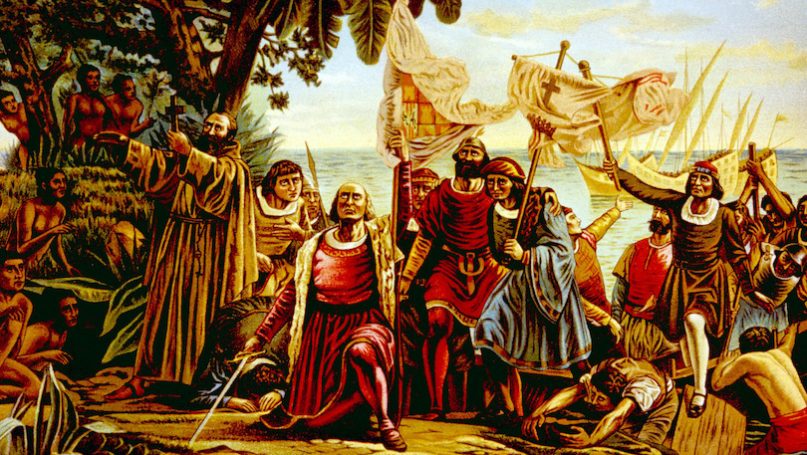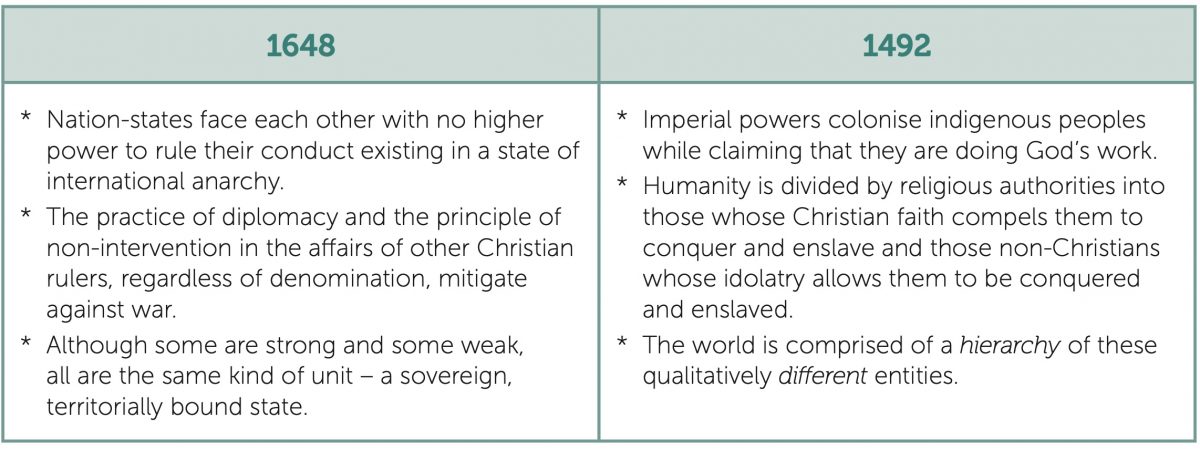
This feature is part of the online resources to accompany the textbook Foundations of International Relations.
1648 is commonly regarded as the origin point for our global system and remains an important date in European history. Yet the Treaty of Westphalia provided for the principles of mutual recognition only within that portion of humanity that came to be represented as the European and Christian ‘family of nations’. Now think about 1492. Instead of sovereignty and non-intervention, this date is associated with conquest and discovery – the cardinal norms of empire that sought to cover the globe with a holy hierarchy of humanity However, another year is worthy of mention. In 1492, Christopher Columbus sailed from the Canary Islands off the north-west African coast, crossed the Atlantic, landed in the Bahamas and thus inaugurated the age of European empire and the rise of what we nowadays call ‘the West’. From the introduction of potatoes into culinary diets worldwide, to the genocides of indigenous peoples, to slavery and abolition, and to the creation of the most powerful military force the world has ever seen (the United States), the ‘discovery’ of the Americas has come to fundamentally shape our present. Chapter three situates the idea of discovery within the European mapping of the world prevalent in Columbus’s era. This map sketched out a hierarchy of human beings, with those belonging to European Christendom occupying the apex position, thus justifying the conquest of non-European, non-Christian peoples.

Accompanying the chapter, the multimedia and textual resources below explore various angles on whether the ‘conquest’ and ‘discovery’ associated with 1492 might contain deeper-determining norms and practices than those of ‘non-intervention’ and ‘sovereignty’ associated with 1648 and suggest that ideas such as sovereignty and diplomacy have always been entangled with conquest and colonialism. That is the provocation that leads many scholars to seek to better understand our contemporary global predicaments, which are still laden with the after-effects of colonialism and all that came with it.
Text adapted from Shilliam, Robbie, ‘Discovery, Conquest and Colonialism’. In, McGlinchey, Stephen. 2022. Foundations of International Relations. London: Bloomsbury.
Unpacking and Debating Racism and Colonialism
Scientific Racism. The Anti-Empire Project – Podcast
A visual map of the most constructive anti-colonial conferences of Global South nations, both prior to and after the Bandung conference.
What We Talk About When We Talk About Decolonization – Podcast
Why Is Mainstream International Relations Blind to Racism? – Article
Is ‘race’ modern? – Article
The Valladolid Debate
Columbus’ Voyages and Their Impact
Indigenous Peoples and Sovereignty
Restoring Indigenous Self-Determination: Theoretical and Practical Approaches – free e-book